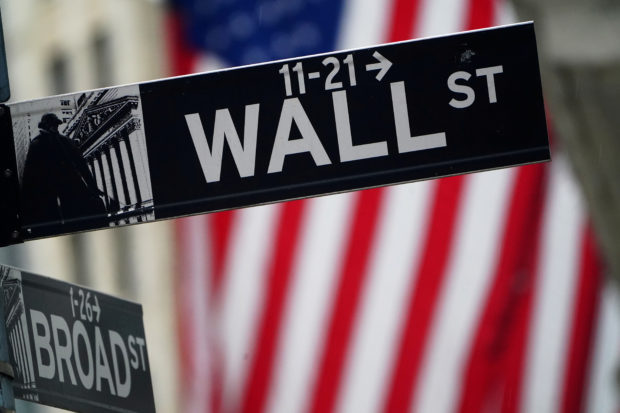Stocks rebound in late-day rally on Wall Street

A Wall Street sign is pictured outside the New York Stock Exchange in the Manhattan borough of New York City, New York, U.S., October 2, 2020. REUTERS/Carlo Allegri/File Photo
NEW YORK – U.S. stocks rose in a late-day rally on Thursday as investors bought stocks likely to do well in the recovery and picked up beaten-down Apple and Tesla shares in anticipation that the U.S. economy grows at its fastest pace in decades this year.
President Joe Biden cited as economic progress Labor Department data that showed a declining number of Americans claimed unemployment insurance, news investors shrugged off earlier as Wall Street traded lower most of the session.
The labor report on Thursday showed claims for unemployment benefits dropped to a one-year low last week, a sign that the U.S. economy is on the verge of stronger growth as the public health situation improves and temperatures rise.
An end-of-quarter rebalancing of investment portfolios by institutional investors added to another mostly seesaw session in which the major Wall Street indexes rose and fell amid the ongoing rotation from growth into so-called value stocks.
Value stocks again outperformed growth stocks, rising 1.2% in the former compared with a 0.1% slide in the latter, even as Apple Inc and Tesla Inc led the rally. Tesla added 1.6% and Apple 0.4%.
Article continues after this advertisement“It’s a very confused stock market, there isn’t real leadership,” said Tim Ghriskey, chief investment strategist at Inverness Counsel in New York.
Article continues after this advertisement“One day cyclicals are in favor, the next day it’s tech-plus is in favor,” he said. “But on the positive side, there isn’t what I call aggressive selling.”
The Dow Jones Industrial Average rose 199.42 points, or 0.62%, to 32,619.48. The S&P 500 gained 20.38 points, or 0.52%, to 3,909.52 and the Nasdaq Composite added 15.79 points, or 0.12%, to 12,977.68.
Volume on U.S. exchanges was 12.69 billion shares, compared with the 13.84 billion average for the full session over the last 20 trading days.
Earlier, the Dow was higher while the Nasdaq fell, a reverse correlation that already has occurred far more this year than is typical in an entire year, said David Bahnsen, chief investment officer at the Bahnsen Group in Newport Beach, California.
“Any reverse correlation between the Dow and Nasdaq is pretty embedded right now, and I expect it will continue,” Bahnsen said. “There is ongoing rotation out of tech, there’s ongoing de-risking for some of the small caps.”
The Nasdaq Composite has fallen in March after four straight months of gains as rosy economic projections lifted demand for undervalued cyclical stocks, but also raised fears of higher inflation as seen in the jump in 10-year Treasury yields.
The rapid rise in the 10-year is not bearish but rather a bullish indicator, Bahnsen said.
The yield of the benchmark Treasury note rose to 1.6297%.
“It is happening because we’re vaccinating, it is happening as the economy reopens, it is happening because we’re going to get a really big, high single-digit GDP number this year,” he said.
The CBOE volatility index also seesawed, closing down at 19.84.
Shares of Nike Inc fell 3.4% as the sporting goods giant faced a Chinese social media backlash over its comments about reports of forced labor in Xinjiang.
Darden Restaurants Inc surged 8.2%, the largest percentage gainer on the S&P 500, after it announced a new share buyback plan and forecast upbeat fourth-quarter revenue and profit.
Advancing issues outnumbered declining ones on the NYSE by a 1.66-to-1 ratio; on Nasdaq, a 1.75-to-1 ratio favored advancers.
The S&P 500 posted 16 new 52-week highs and no new lows; the Nasdaq Composite recorded 30 new highs and 168 new lows.